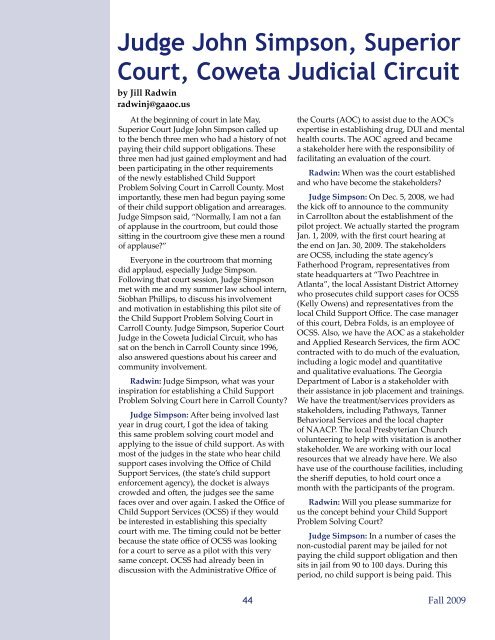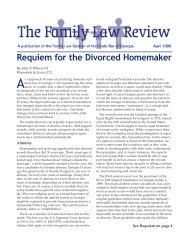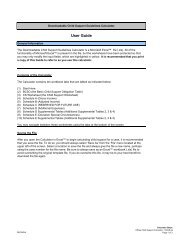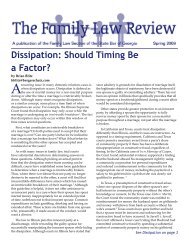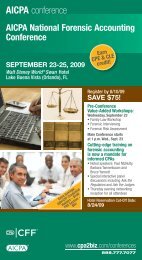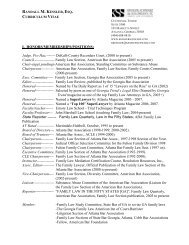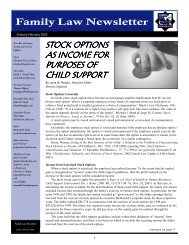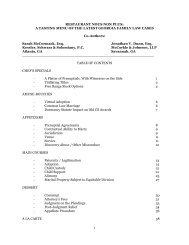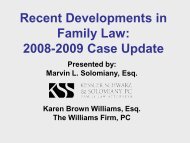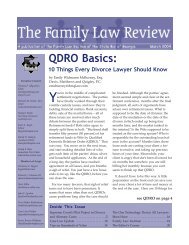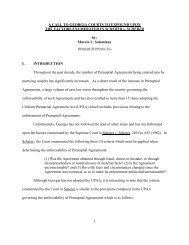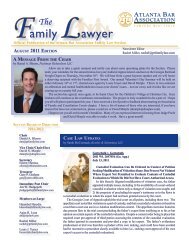Fall 2009 - Atlanta - Divorce Lawyer - Family Law - Atlanta Georgia
Fall 2009 - Atlanta - Divorce Lawyer - Family Law - Atlanta Georgia
Fall 2009 - Atlanta - Divorce Lawyer - Family Law - Atlanta Georgia
Create successful ePaper yourself
Turn your PDF publications into a flip-book with our unique Google optimized e-Paper software.
Judge John Simpson, SuperiorCourt, Coweta Judicial Circuitby Jill Radwinradwinj@gaaoc.usAt the beginning of court in late May,Superior Court Judge John Simpson called upto the bench three men who had a history of notpaying their child support obligations. Thesethree men had just gained employment and hadbeen participating in the other requirementsof the newly established Child SupportProblem Solving Court in Carroll County. Mostimportantly, these men had begun paying someof their child support obligation and arrearages.Judge Simpson said, “Normally, I am not a fanof applause in the courtroom, but could thosesitting in the courtroom give these men a roundof applause?”Everyone in the courtroom that morningdid applaud, especially Judge Simpson.Following that court session, Judge Simpsonmet with me and my summer law school intern,Siobhan Phillips, to discuss his involvementand motivation in establishing this pilot site ofthe Child Support Problem Solving Court inCarroll County. Judge Simpson, Superior CourtJudge in the Coweta Judicial Circuit, who hassat on the bench in Carroll County since 1996,also answered questions about his career andcommunity involvement.Radwin: Judge Simpson, what was yourinspiration for establishing a Child SupportProblem Solving Court here in Carroll County?Judge Simpson: After being involved lastyear in drug court, I got the idea of takingthis same problem solving court model andapplying to the issue of child support. As withmost of the judges in the state who hear childsupport cases involving the Office of ChildSupport Services, (the state’s child supportenforcement agency), the docket is alwayscrowded and often, the judges see the samefaces over and over again. I asked the Office ofChild Support Services (OCSS) if they wouldbe interested in establishing this specialtycourt with me. The timing could not be betterbecause the state office of OCSS was lookingfor a court to serve as a pilot with this verysame concept. OCSS had already been indiscussion with the Administrative Office ofthe Courts (AOC) to assist due to the AOC’sexpertise in establishing drug, DUI and mentalhealth courts. The AOC agreed and becamea stakeholder here with the responsibility offacilitating an evaluation of the court.Radwin: When was the court establishedand who have become the stakeholders?Judge Simpson: On Dec. 5, 2008, we hadthe kick off to announce to the communityin Carrollton about the establishment of thepilot project. We actually started the programJan. 1, <strong>2009</strong>, with the first court hearing atthe end on Jan. 30, <strong>2009</strong>. The stakeholdersare OCSS, including the state agency’sFatherhood Program, representatives fromstate headquarters at “Two Peachtree in<strong>Atlanta</strong>”, the local Assistant District Attorneywho prosecutes child support cases for OCSS(Kelly Owens) and representatives from thelocal Child Support Office. The case managerof this court, Debra Folds, is an employee ofOCSS. Also, we have the AOC as a stakeholderand Applied Research Services, the firm AOCcontracted with to do much of the evaluation,including a logic model and quantitativeand qualitative evaluations. The <strong>Georgia</strong>Department of Labor is a stakeholder withtheir assistance in job placement and trainings.We have the treatment/services providers asstakeholders, including Pathways, TannerBehavioral Services and the local chapterof NAACP. The local Presbyterian Churchvolunteering to help with visitation is anotherstakeholder. We are working with our localresources that we already have here. We alsohave use of the courthouse facilities, includingthe sheriff deputies, to hold court once amonth with the participants of the program.Radwin: Will you please summarize forus the concept behind your Child SupportProblem Solving Court?Judge Simpson: In a number of cases thenon-custodial parent may be jailed for notpaying the child support obligation and thensits in jail from 90 to 100 days. During thisperiod, no child support is being paid. This44<strong>Fall</strong> <strong>2009</strong>


